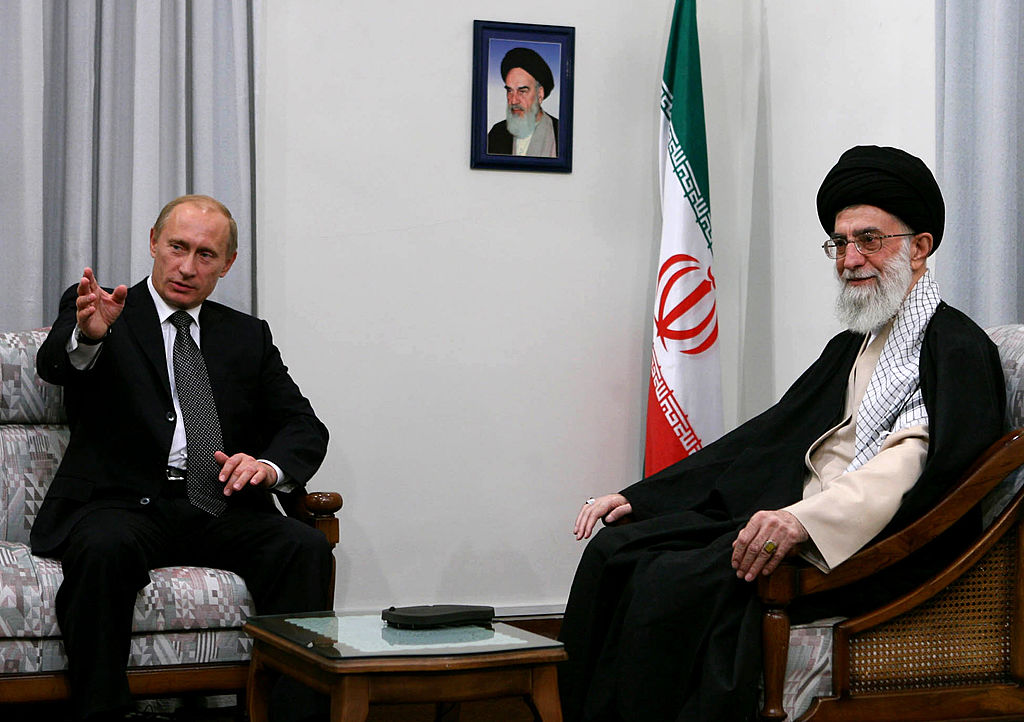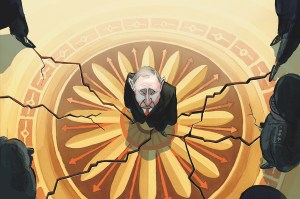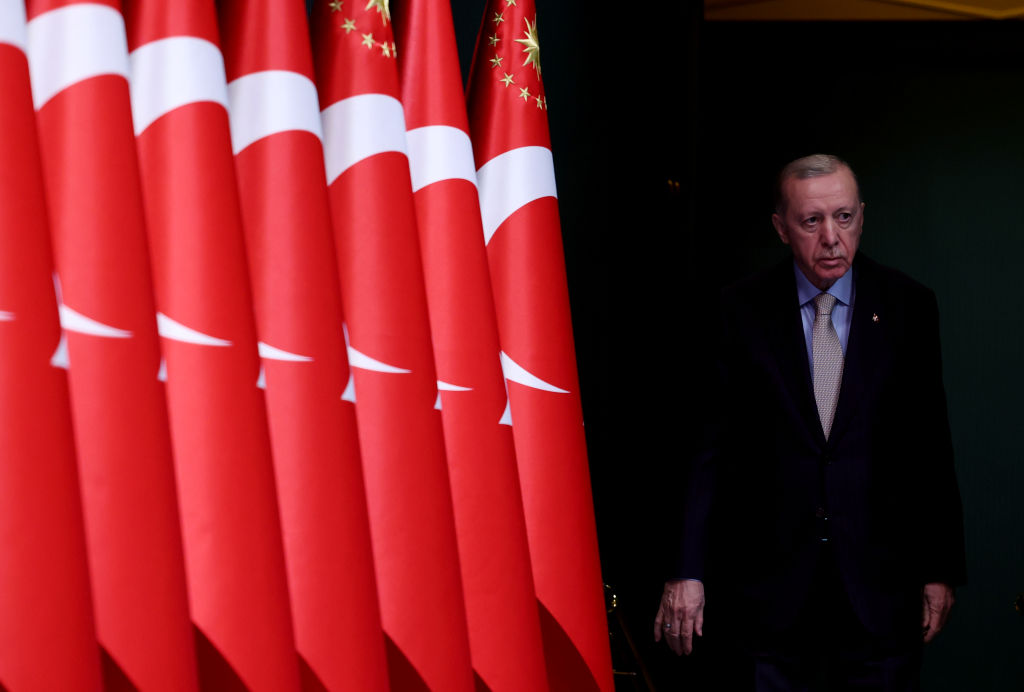Russian President Vladimir Putin’s visit to Tehran last week brought attention to a growing partnership between Russia and Iran. The Russian shook hands with Iranian Supreme Leader Ali Khamenei, a rare gesture since both men are notorious coronaphobes. The old cleric expressed support for the Russian invasion of Ukraine, while the old KGB man offered Iran supplies of grain. US intelligence even claims Iran will open its drone arsenals to Russia. This strange friendship has its limits, but its growth could spell trouble.
History does not suggest this is a natural partnership. The list of grievances between Iran and Russia is long. Great powers are often rough with middle-power neighbors. Russia carved off chunks of Iran on the Caspian in the treaties of Gulistan and Turkmenchay and pushed back Iranian claims in Central Asia in the Treaty of Akhal. The Russian embassy rivaled that of the British as a source of intrigues against Iranian sovereignty. An angry mob stormed the Russian embassy, killing Russia’s ambassador Alexander Griboyedov.
Russia collaborated with the British to divide Iran into spheres of influence in 1907, fought the Turks on Iranian territory during World War I, and invaded Iran during World War II. When the war ended, it tried to take two more bites out of northwestern Iran, setting up Communist states in Mahabad and Iranian Azerbaijan. Iran, in turn, aligned with the United States, hosting spy stations and swarms of American defense contractors.
Yet the two sides need not look so far back to find causes for dissension. Russia has long kept advanced air defenses with its forces in Syria. Yet it allows Israel to raid Iranian and Iran-linked targets in Syria all the time; Israeli officials suggest the number of airstrikes is in the hundreds. These raids continued even after a Syrian surface-to-air missile site shot down a Russian intelligence aircraft, killing fifteen, which was operating near an Israeli strike package.
The diplomatic history has plenty of friction too. A leaked recording last year caught former Iranian foreign minister Mohammad Javad Zarif complaining that Russia had been helpful to Iran during its nuclear talks with the United States until a deal seemed reachable — at which point the Russians began to create obstacles. Russia may have repeated this performance after invading Ukraine. Russia had also held back on delivering S-300 surface-to-air missiles to the Iranians during the nuclear talks. This Russian policy increased Iran’s vulnerability to attack and put Moscow in alignment with Washington and Brussels against Tehran. And Russia has taken advantage of Western sanctions to gobble up Iran’s share of the oil market.
The new Ebrahim Raisi administration desires a partnership with Russia more strongly than that of its predecessor Hassan Rouhani. Raisi traveled to Moscow in January to meet with Russian president Vladimir Putin. Yet he apparently didn’t make enough of an impression for Putin spokesman Dmitry Peskov to remember his name. Peskov told reporters ahead of last week’s Tehran trip that Putin planned to meet with Rouhani. Russia’s current ambassador in Tehran, while faring better than Griboyedov, has nonetheless attracted Iranian ire with a string of impolitic remarks in the press. In this light, Russia’s apparent need for Iranian drones is a humiliation — as if America had sought weapons from Cuba during the Iraq War.
So why are these two old foes so friendly these days? The West is a big part of the answer. First, Iran and Russia are isolated from the Western part of the international system, and the West’s dominant role in the global financial system has been a particular headache to both. Russia is the relative newcomer here: major sanctions largely follow its 2014 and especially 2022 invasions of Ukraine. And despite grand pronouncements, it is only the “world’s most sanctioned country” by the number of Russian sanctions targets; the sanctions targeting Iran are far more severe.
Second, Iran and Russia both have a structural and ideological desire to reorder the international system. All those sanctions are a reminder that this system is still centered on the West and still subject to Western foreign policy goals. That’s no good if you aim to do things the West doesn’t like, such as seize a Western-oriented neighbor’s territory or edge closer to nuclear breakout.
Danger can follow whenever the dominant states of the day try to squeeze their rivals out of the international system. For example, the Soviet Union and Germany were not natural partners. Communists had tried to take over Germany at the end of the First World War, and Nazi Germany was viciously anti-Communist. Yet the Versailles Treaty and the Bolshevik Revolution isolated the two states. They cultivated a quiet partnership, with Germany conducting forbidden military training deep behind the Soviet frontier. The partnership had its ups and downs and both sides sought better friends in the West, but none of that prevented its climax: the 1939 Molotov-Ribbentrop Pact. This deal enabled Germany to concentrate its forces for conquest. Rough history and ideological enmity didn’t prevent partnership.
There are real limits on the Russian-Iranian partnership. Structurally, the two sides compete for influence in Syria and have had different visions for its future (a strong state, say the Russians; a playground for proxies and a second front against Israel, say the Iranians). They compete in the oil market. And in all things Iran is the junior partner, subjecting it to its big neighbor’s greater heft. Iran’s potent nationalism compounds that — even a brief deployment by Russian bombers to Iran drew public outrage. History doesn’t force Iran and Russia to be enemies, but it did give Iran a chip on its shoulder in dealings with larger powers.
Yet even limited partnerships between important countries can be pivotal. The Soviet-German partnership is one warning of that. Iran is a regional power, not a great power, so it has less to offer. But serious Russian security aid to Iran could shift the balance in the Gulf. Such a shift would not enable Iranian wars of conquest, but it might enable an Iranian bomb. If the Putin-Raisi grain deal works out, it may reduce Western sanctions’ pressure on Iran, especially in their ability to generate protests. Better Iranian air defenses and ballistic missiles could deter an Israeli or American strike on Iranian nuclear facilities. Even if Russian-Iranian relations stall, excluding two major hydrocarbon producers from the global market ensures there will be more money chasing after fewer goods — that is, inflation. Dual exclusion may not look so good in hindsight.

























